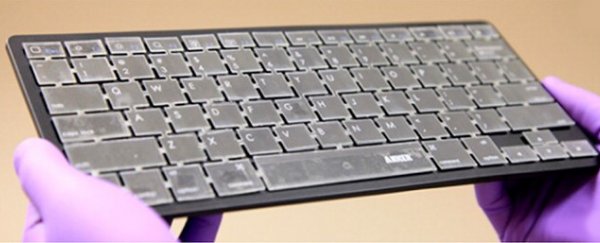Some people type with the grace of a concert pianist, while other people pound away on their keyboard like it's a drum in a marching band. The point is, people type differently.
Now, a keyboard developed by researchers at the Georgia Institute of Technology in the US and the Chinese Academy of Sciences is taking advantage of our different typing styles to improve security for personal computers.
The intelligent keyboard, nicknamed IKB, can accurately identify users (and intruders) in real-time based on the way they tap the keys. It does this by converting "typing motions" into dynamic electrical signals, which act as something of a biometric signature.
The researchers say the electric signals generated by typing "not only relate to the manner and rhythm of the keystroke, but also concern… typing habit, the size of the person's fingers, individual bioelectricity, the applied typing press force, the typing speed, and so on."
The signals "provide an unprecedentedly accurate, unique, and permanent typing pattern for further verification and identification purposes," the authors wrote in their report, published in the journal ACS Nano.
But the IKB is more than just another security measure to protect your identity and personal information: the keyboard is also self-powered and self-cleaning.
When your finger tips touch the keys they generate friction, and the IKB is able to convert this energy into electricity to power itself.
The researchers also say you might be able to charge a small electronic device with an "arbitrary typing speed greater than 100 characters per minute" - presumably sustained over some length of time (maybe an essay, maybe a novel, we're not sure).
And unfortunately, they don't elaborate on how much power you can generate if you're an exceptionally fast typist, like some of these prodigies. But they did note in the study that "even a sweaty hand can barely degrade the output performance". (This relates to the generation of electricity and the keyboard's ability to identify the user).
Finally, the device has also been constructed in such a way that makes juice spillage, and the odd sandwich crumb stuck in the mechanical crevice between keys, less of an issue.
As Natasha Lomas writes for TechCrunch: the IKB "self cleans, thanks to a dirt repellent coating and crafty composition - thin layers of plastic, topped and tailed with conductive film."
This construction also means it's a one-piece, non-mechanical device (if you needed yet another reason to believe in IKB's awesome capabilities).
Although the cost was not mentioned, Zhong Lin Wang, one of the scientists involved in the research, told TechCrunch: "The technology is ready for commercialisation within a couple of years if someone is willing to invest."
Source: TechCrunch
